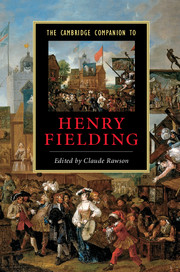Book contents
- Frontmatter
- Introduction
- 1 Henry Fielding’s life
- 2 Fielding’s theatrical career
- 3 Shamela
- 4 Joseph Andrews
- 5 Jonathan Wild
- 6 Tom Jones
- 7 Amelia
- 8 Fielding’s periodical journalism
- 9 Fielding and female authority
- 10 Fielding on society, crime, and the law
- 11 Fielding’s style
- 12 Fielding’s afterlife
- Guide to further reading
- Index
- Series List
6 - Tom Jones
Published online by Cambridge University Press: 28 July 2007
- Frontmatter
- Introduction
- 1 Henry Fielding’s life
- 2 Fielding’s theatrical career
- 3 Shamela
- 4 Joseph Andrews
- 5 Jonathan Wild
- 6 Tom Jones
- 7 Amelia
- 8 Fielding’s periodical journalism
- 9 Fielding and female authority
- 10 Fielding on society, crime, and the law
- 11 Fielding’s style
- 12 Fielding’s afterlife
- Guide to further reading
- Index
- Series List
Summary
Tom Jones, observes David Richter, 'is in danger of being thought an easy read'. This danger has lurked through readings of the novel since its first publication. Samuel Johnson famously accused Fielding of presenting only the clock-face of human nature, in contrast to his great rival Richardson, who exposed humanity’s hidden springs and wheels. In the twentieth century, F. R. Leavis was only echoing prevailing orthodoxies when he dismissed 'Fielding’s attitudes, and his concern for human nature' as ’simple', and therefore unworthy of the English novel’s 'Great Tradition'. This alleged simplicity was redeemed to some extent by formalist criticism of the 1950s and 1960s, which valued the classical symmetry of the novel’s stylistic architecture, the neat order of its eighteen-book division, its balancing of episodes at the beginning and the end. But in the wake of post-structuralism and post-modernism, with their fetish for dissonance and disharmony, Tom Jones has again seemed as outmoded as a Palladian façade or manicured lawn. The beneficiary of this assessment has remained Richardson. If Clarissa delves into the dark paradoxes of sexuality and textuality, it is claimed, Tom Jones exhibits only the rough bonhomie of old-fashioned masculinity; if Richardson heralds a modern age of democracy and feminism, Fielding holds fast to the patriarchal privileges and property rights of a feudal age that was passing even as he wrote.
This judgement has not gone entirely unchallenged. William Empson, while conceding that it seems 'particularly absurd' to 'leap to ambiguity' in order to explain Tom Jones, nonetheless theorizes on Fielding’s 'double irony' - his technique of holding opposed judgements on moral matters in ironic suspension. Empson’s famous assessment looked forward to Richter’s more recent argument that Fielding is unattractive to post-modernism precisely because he undermines and dissolves the binary oppositions that this school of criticism favours in its quest for logical indeterminacy.
- Type
- Chapter
- Information
- The Cambridge Companion to Henry Fielding , pp. 80 - 93Publisher: Cambridge University PressPrint publication year: 2007
- 1
- Cited by

